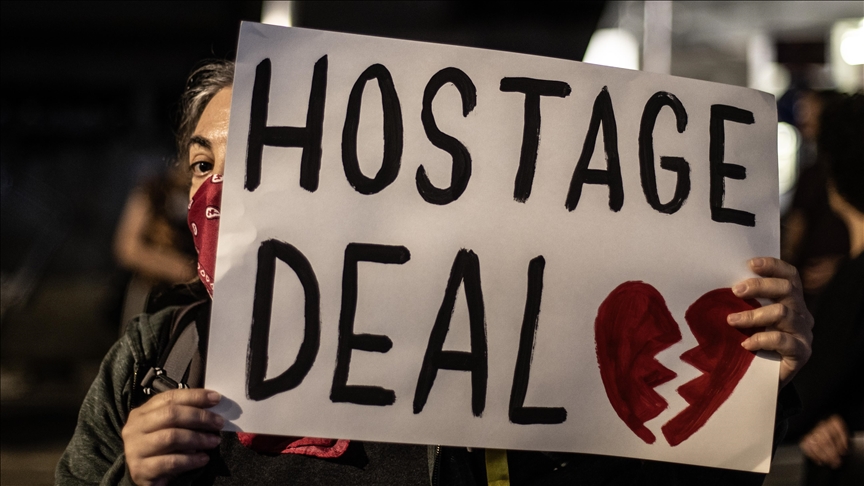RAMALLAH, Palestine
The announcement of a humanitarian pause in the ongoing conflict in the Gaza Strip has brought attention to hostage swap deals between Israel and Palestinian factions.
The Qatari Ministry of Foreign Affairs declared early Wednesday the success of joint mediation efforts with Egypt and the United States between Israel and Hamas. This resulted in a pause agreement that included the exchange of 50 Israeli prisoners, including civilian women and children from Gaza, in the first phase. In return, 150 Palestinian women and children held in Israeli prisons will be released.
According to the deal, the number of those released will increase in subsequent stages of the deal.
On Oct. 7, Hamas captured 239 Israelis, including high-ranking military personnel, intending to exchange them for over 7,000 Palestinian prisoners in Israeli jails.
Since then, the Israeli military has waged a devastating war on Gaza, resulting in over 14,128 Palestinian fatalities, including 5,840 children and 3,920 women, and over 33,000 injuries, 75% of which are children and women, according to the Gaza government’s media office.
Hamas and other Palestinian resistance factions claim to have enough prisoners to “empty Israeli prisons of all Palestinian detainees.” The Palestinian Prisoners Club data indicates that Israel holds approximately 7,000 prisoners, including 200 children, 78 women, and hundreds of sick and injured individuals.
According to the Palestinian Prisoners Club, Israel has arrested 3,000 Palestinians since Oct.7, only in the West Bank.
Since the establishment of the state of Israel on occupied Palestinian land in 1948, Palestinians and Arab governments have sought to free the largest number of prisoners from Israeli jails.
Hostage swap deals have been the most common and effective means throughout the conflict. The following highlights the top 10 hostage swap deals between Palestinian factions and Israel from 1968 to 2011.
Swap deals
– July 23, 1968
The first hostage swap between the Palestine Liberation Organization (PLO) and Israel occurred after Palestinian fighters from the Popular Front for the Liberation of Palestine (PFLP), led by Yousuf Al-Radee and Leila Khaled, successfully executed the first hijacking of an Israeli plane. The aircraft, belonging to El Al Israeli Airlines, was en route from Rome to Tel Aviv when the hijackers diverted it to Algeria, forcing it to land. Onboard were more than 100 passengers.
Later, the PFLP released the passengers in exchange for Israel’s release of 37 Palestinian prisoners with high convictions, including those detained before 1967. The International Committee of the Red Cross facilitated this exchange.
– 1969
A group of PFLP members, led by Leila Khaled, attempted to hijack another Israeli plane to secure the release of Palestinian prisoners held in Israeli jails. The plane landed in Britain, but the hijacking operation failed, resulting in the death of one of the perpetrators. British authorities arrested Leila Khaled. Subsequently, the PFLP hijacked a British plane and conducted a swap deal, leading to the release of Leila Khaled.
– Jan. 28, 1971
In a prisoner exchange deal facilitated by the International Committee of the Red Cross between the Palestine Liberation Organization (PLO), specifically Fatah, and Israel, Palestinian prisoner Mahmoud Bakr Hijazi was released in exchange for the release of Israeli soldier Shmuel Faiyaz, who Fatah had abducted in late 1969.
– March 14, 1979
The “Norus” exchange operation between Israel and the Palestine Liberation Organization (PLO), conducted by the Popular Front for the Liberation of Palestine – General Command (PFLP-GC), a faction within the organization, resulted in the release of Israeli soldier Abraham Amram. He had been captured by the PFLP-GC on April 5, 1978, in the Litani operation. In return, Israel released 76 prisoners from various Palestinian factions, including 12 Palestinian women.
– Mid-February, 1980
The Israeli government decided to release Palestinian prisoner Mahdi Bssaiso in exchange for the release of Jordanian citizen Amina Dawood Al-Mufti. She had worked for the Israeli foreign intelligence agency Mossad and was held by Fatah. The swap took place in Cyprus under the supervision of the International Committee of the Red Cross.
– Nov 23, 1983
In an exchange between the Israeli government and Fatah, Israel released all prisoners from the ‘Ansar Detention Camp’ in southern Lebanon. The released individuals included 4,700 Palestinian and Lebanese prisoners, along with 65 prisoners from Israeli jails. In return, Israel secured the release of six Israeli soldiers from the special unit “Nahal,” who had been captured in the Bhamdoun area of southern Lebanon on Sep. 4, 1982.
– May 20, 1985
Israel conducted a swap deal with the Popular Front for the Liberation of Palestine (PFLP), known as Operation’ Galilee,’ in which it released 1,155 Palestinian and Lebanese prisoners from its jails in exchange for three Israeli soldiers held by the PFLP.
– 1997
– There was a swap operation between the Jordanian government and Israel, where Tel Aviv released Ahmed Yassin, the founder of the Islamic Resistance Movement (Hamas), along with two of his companions. In return, Israel secured the release of two Mossad operatives who Jordanian security forces had arrested in a failed assassination attempt on the then-political bureau chief of Hamas, Khaled Meshaal.
– Early October, 2009
– Israel released 20 Palestinian female prisoners from the West Bank and Gaza in exchange for obtaining a recently recorded video lasting two minutes that featured the Israeli soldier Gilad Shalit, captured by Palestinian resistance factions on June 25, 2006.
– Oct 11, 2011
Israel freed 1,027 Palestinian prisoners in a major swap, securing the release of soldier Gilad Shalit. Hamas named the operation (Faithful to the Free) “Wafaa Al-Ahrar,” while Israel dubbed it “Closing the Time.”

